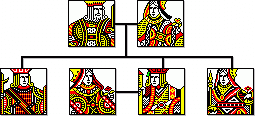The important thing, once you have enough to eat and a nice house, is what you can do for others, what you can contribute to the enterprise as a whole.
Donald Knuth
Introduction
The Family Pack is an ambitious open source project to create a new cross platform genealogy program. The project will involve designing a new genealogical database, creating a program to make use of it, and finally, organising ways of providing some standard universal data sets.
The starting point for the database design was the impressive GenTech Genealogical Data Model, but the current design has significantly changed and the design is continuing to move away.
One idea taken directly from the GenTech GDM is that of Personas. A personas is a small separate particles of information that relates to a person. We can collect these personas from separate sources and then build them up to create individual person. The TFP database extends this concept to events and has created the Eventa to represent the record of an event. To link together these Personas and Eventas and associated Dates, Places and Relationships, the database has a Reference Statement. This idea is loosely based on the GenTech's Assertion record. The Reference Statement is the heart of the new database and provides a very flexible way of entering and organizing evidence. It can consist of any typed statement and could be a simple statement by the researcher reviewing other statements, a transcription of a historical documents (certificates, census, parish records etc.), a description of a photograph or transcribed tape recording.
Modern genealogical programs can provide a wealth of features for both amateur and professional genealogists so starting a project to add a new member among their number is a daunting prospect. However, a new design of database offers new possibilities and new ways of doing things. As well as the standard methods of entering an individuals information, it should be possible to enter information directly from the evidence. For instance, it should be possible to directly enter a transcription of a census return (aided by a template) and indicate whether the people already exist in the database, are new people to be added or are just incidental (but may become relevant in the future). The program should be able do the rest for you.
One area where current programs have poor support is in internationalisation, they tend to assume a particular culture in things like naming conventions and religious observances. The Family Pack will try to avoid this, but to a large extent this will depend on attracting the support of developers from varied backgrounds (all my direct ancestors, for which I have birth details, were born in England!).
Universal Data
The process of researching your family tree generally involves studying more general aspects of history and geography. In this way you may become quite expert in particular field and the information you gather could be very useful to others. It is a long term objective of this project that such information is captured and recorded in a universal database. In this way a gazetteer can be built up, which includes the changes in names and boundaries over time. A catalogue of Sources and Repositories can be built up, possibly linked to templates to simplify entering standard format sources. A historical time line of events, both general and local, can be created to provide a context for the lives of those we are studying.
Current Status
The current status of the project is pre-alpha and development is mainly focused on producing a Windows version of the program and an early version has been made available. Gnu/Linux and Max OSX versions have been build and run but testing is limited and binaries are not yet available. See the Route Map page for more details.

